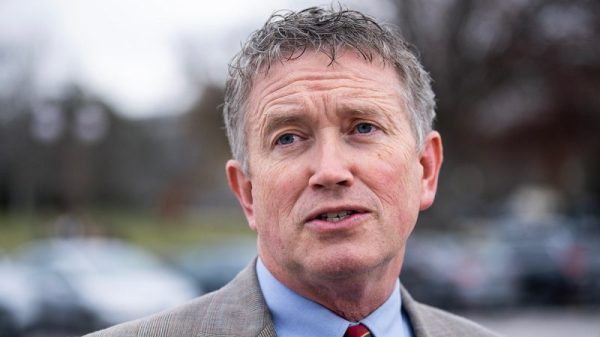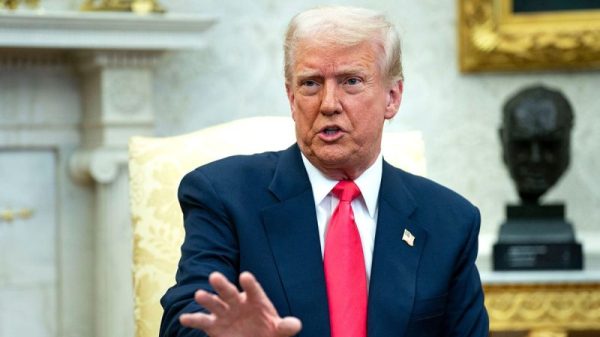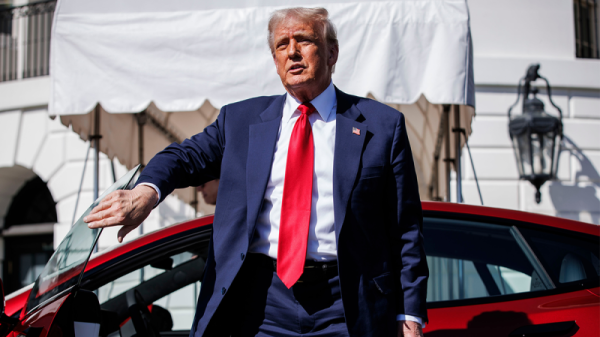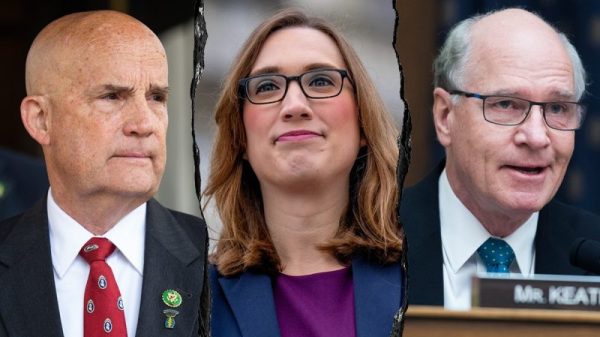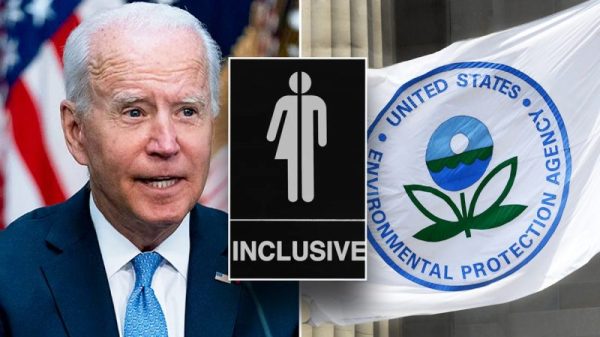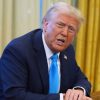The federal government will dramatically increase security protections for the joint session of Congress where lawmakers count states’ electoral votes, an escalation of government-wide efforts to prevent a repeat of the Jan. 6, 2021, attack on the Capitol, the Secret Service said Wednesday in a statement provided to The Washington Post.
The Department of Homeland Security has designated the next electoral count — scheduled for Jan. 6, 2025 — a National Special Security Event, giving the once-routine post-election gathering the same level of security accorded to presidential inaugurations and political conventions, the Secret Service, which will take over security for the count, confirmed.
“National Special Security Events are events of the highest national significance,” Eric Ranaghan, the special agent in charge of the U.S. Secret Service’s Dignitary Protective Division, said in the statement. “The U.S. Secret Service, in collaboration with our federal, state, and local partners are committed to developing and implementing a comprehensive and integrated security plan to ensure the safety and security of this event and its participants.”
The designation, which followed a request from D.C. Mayor Muriel E. Bowser and a recommendation by the House select committee charged with investigating Jan. 6, is intended to unlock funds and law enforcement resources from across the federal government to protect members of Congress while they certify the election results — the very job lawmakers were doing when a mob of Donald Trump’s supporters stormed the Capitol.
But Congress, which is in the midst of a fierce battle over government funding, must act to ensure the Secret Service has enough money to secure National Special Security Events and protect Trump and Vice President Kamala Harris, the Democratic presidential nominee, for the remainder of the election, the White House Office of Management and Budget said in a request sent to lawmakers in recent weeks.
The DHS decision is only the latest step in an effort by people inside and outside of government to prevent a repeat of the chaos triggered by Trump’s lies about the 2020 election.
Across Washington and the country, lawmakers, aides, lawyers, activists, political strategists and law enforcement officers who aim to protect the peaceful transition of power next January have spent much of the past few years thinking through and preparing for a dizzying array of nightmare post-election scenarios.
Their fears, which they have laid out in tabletop exercises, legal briefs, internal conversations and secretive law enforcement plans, are myriad and specific. Some worry that members of the House of Representatives could struggle for weeks to elect a speaker, making certification of the election results impossible. Others are concerned that a handful of lawmakers could delay the seating of members-elect, leaving the people elected by voters to represent their district hamstrung, without any authority or ability to conduct essential business.
The people gaming out these potential scenarios acknowledge that they can’t possibly anticipate every possible threat to the peaceful transfer of power. The fact that Trump declined during his debate with Vice President Kamala Harris to express a single regret about his actions on Jan. 6, 2021, and has continued to stoke baseless claims of election fraud, makes the period after November’s election even harder to predict.
But the people gaming out the 2024 post-election landscape are determined to avoid the pitfalls they experienced the last time around.
“Last time we were steeped in potential parliamentary maneuvers around the rejection of the electoral college votes and the attempt to trigger a contingent election in the House, so we were ready for those parliamentary maneuvers, but we were not ready to talk about what would happen if protests outside turned violent and then entered the Capitol and overran the chambers,” said Rep. Jamie Raskin (Md.), ranking Democrat of the House Oversight Committee who also sat on the select committee that investigated the Jan. 6, 2021, attack.
“So we are now trying to prepare for every conceivable contingency we can think of,” Raskin added.
A team under Rep. Joseph Morelle (N.Y.), the ranking Democrat on the Committee on House Administration, is handling the research and analysis behind the “list of horribles,” as one person involved with the effort called the scenarios that could derail the electoral certification.
Off the Hill, a small working group within Protect Democracy, a nonpartisan nonprofit dedicated to identifying and fighting threats to American democracy, has been facilitating tabletop exercises to game out what might happen — and how they’d advise members who support a peaceful transition to respond.
A broader group of people with congressional, political and legal expertise initially gathered for one big meeting that dispersed into breakout sessions, where they ran through all of the “twists and turns” of different scenarios, according to one participant, who spoke on the condition of anonymity to discuss confidential planning. Following that meeting, a smaller group of congressional and parliamentary experts have met on a monthly basis on Zoom to drill into the details of various post-election scenarios.
The meetings and group sessions are confidential, but Ian Bassin, the co-founder and executive director of Protect Democracy, acknowledged the work of the group in a statement to The Post.
“The last time Congress met to count presidential electoral votes, Donald Trump incited an insurrection on the Capitol after which 147 Members of Congress voted to thwart the will of the voters,” Bassin wrote in an email. “The law has been updated since then to prevent something like that from happening again and its entirely normal when a new law is passed for members and civil society groups alike to get educated on how the new law works and be ready to ensure the law is followed even if — especially if — attempts to corrupt the process like we saw in the past are tried again.”
And at the Capitol Police’s D Street headquarters, Capitol Police Chief J. Thomas Manger, who took over the force six months after the riot, is already thinking through security ahead of next January and coordinating with the D.C. National Guard to figure out how to respond to any threat.
Members of Congress are not yet fully engaged with planning, as research and prep is ongoing, but both Morelle’s team and Protect Democracy plan to circulate their findings to members later this year.
The Capitol Police now have 2,200 sworn officers, about 250 more than four years ago, Manger said, and plans are in place to mobilize thousands of officers from the region and elsewhere to help if needed.
“We are better equipped, better trained and have a better operational plan than we did on Jan. 6,” Manger said, referring to 2021. Unlike four years ago, when debate raged over bureaucratic delays in mobilizing the National Guard, Manger now has the authority to make the request himself without going through a more cumbersome process that was previously in place.
After the election, Manger said, “we’ll get a clearer picture of what we might expect” on Jan. 6 and at the inauguration. “Depending on what we hear, and what happens, we’ll plan accordingly.”
That could include unscalable fencing going around the Capitol, call-up of the D.C. National Guard and additional officers deputized to work in D.C. Earlier this summer, more than 200 police officers from New York City helped Capitol Police bolster security for Israeli Prime Minister Benjamin Netanyahu’s address to a joint meeting of Congress. Some demonstrators confronted police, and Manger said threats included one of Netanyahu’s life.
Manger said he has made intelligence a priority, as threats to members of Congress rise at an alarming rate. An agency that fielded fewer than 4,000 threats in 2017 saw that number grow to more than 8,600 in 2020 and to 9,600 in 2023. Those include direct threats and “concerning statements.” Manger said Capitol Police “are a player and an active member of the intelligence community in a way we were not on Jan. 6,” referring to 2001.
In addition to securing the sprawling Capitol grounds, Capitol Police are responsible for protecting members of Congress.
Manger would not say if more members are asking for personal protective details. Members of leadership get details; he said details are assigned to others based on threat levels and would last as long as the threat remains a concern. Manger said about 300 Capitol Police officers were in Milwaukee for the Republican National Convention, and a similar number were present in Chicago for the Democratic convention.
Intelligence officers are “hearing the same chatter that every other person in the intelligence community is picking up,” said Manger. “Extremists on the right and the left talking about threats, talking about civil war, about how they’re going to react if things don’t go the way they wanted it to go.”
“We’d be foolish to ignore that and say it could never happen,” he added.
Jacob Bogage contributed to this report.











